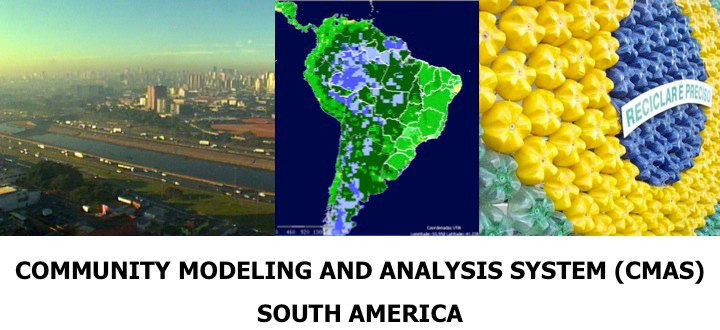 |
|||||||
|
|
Session 1: Air Quality Modeling Applications in South America Air quality pollution has been a major problem and a matter of global concern for decades. High concentrations of different air pollutants are particularly harmful to large cities residents, where numerous anthropogenic activities strongly influence the quality of air. This session is dedicated to the application of air quality modeling studies in South America. |
|
Model intercomparison Statistical analyses and evaluation metrics Measurement networks Impacts on air quality that result from controlling air pollutants |
Session 2: Model Development Work in recent years has vastly improved the science of air quality and methodologies for modeling and analyzing the distribution of air pollutants at various temporal and spatial scales. Such advances were motivated by the results from the multitude of applications and evaluations of air quality models that addressed various research, development and regulatory modeling issues. We seek abstracts that illustrate innovative methodologies and process algorithms in air quality modeling. This session's topics include: |
|
Chemical Mechanisms Variable and adaptive grids Hybrid modeling approaches - methods to couple local and regional models Dry and wet deposition Meteorological processes Dust models |
Session 3: Emissions Inventories This session is dedicated to the application of innovative methodologies for preparing and processing emissions for air quality modeling applications. Techniques to improve estimates of wild fires, dust and biogenic emissions are of special interest for this session. This session's topics include: |
|
Updates to inventories and emissions processing Emissions from alternative fuel use (e.g., bio-fuels in the transportation sector) Emissions from aviation activities Projection of emissions to future-year scenarios Inverse modeling Natural emission sources |
Session 4: Model Evaluation and Analysis Evaluation of air quality modeling systems (including meteorological and emissions models) is a key to identify the integrity of such modeling systems for various applications at various spatial and temporal resolutions. Abstracts are invited to present results of model evaluation studies, with emphasis on new techniques for model evaluation. This session's topics include: |
|
Diagnostic tools Analyses and comparisons with data from measurement networks Inter-model comparisons Process evaluation Evaluation of meteorological models |
Session 5: Policy and Decision Support Air quality models have become indispensable tools in air quality management. This session will focus on research towards science-based policy and applications of models as decision support tools. The session will cover various applications that would inform the decision-making process for air quality improvement. Work that integrates air quality science and modeling with other relevant disciplines such as policy, economics, health, or climate science, and with models used in those disciplines, will be highlighted. Conceptual efforts demonstrating or exploring integrated assessment models and decision support systems will be covered as well. This session topics include: |
|
Exposure and human health assessment Air pollution decision support systems Air pollution-agriculture, and ecological policies Decision making under uncertainty and uncertainty analysis Air pollution economics Design of pollution abatement strategies Coordinated air pollution/climate policies |
Session6: Regulatory Modeling and Applications Air quality models continue to be important tools for guiding decision makers in preparing State Implementation Plan (SIP) applications to set standards for compliance. We seek abstracts that describe how air quality models are used in specific applications, with particular emphasis on the types of sensitivity and diagnostic analyses employed and on the model evaluation studies that were conducted for various applications. This session topics include: |
|
Model intercomparison Statistical analyses and evaluation metrics Measurement networks Impacts on air quality that result from controlling air pollutants |
Session 7: Air Quality and Climate Change Scientific evidence highlights the role of the atmosphere's chemical constituents in driving climate variability at various scales. Direct radiative forcing due to the presence of certain chemical species of atmospheric aerosols (e.g., sulfate) tends to mitigate warming resulting from greenhouse gases. Short-lived climate forcers, such as sulfate, black carbon, and ozone precursors (including NOx, VOCs, CO), are key players in forming the air quality and climate feedback loops. We seek abstracts that address linkages between regional climate variability and air quality. This session topics include: |
|
Regional climate impacts on air quality Impacts of air pollution on climate change Intercontinental transport of pollutants The climate impacts of short-lived climate forcers The impacts of clouds, as carrying media of pollutants and moisture, on climate International applications |
Session 8: Air Pollution Meteorology Meteorological processes are critical to all aspects of air pollution in particular emissions, dispersion and transport, dry and wet deposition, photochemical and chemical reactions, and pollutant concentrations. The accuracy in modeling basic meteorological parameters such as wind speed and direction, and temperature as well as processes such as cloud formation and boundary layer characteristics are fundamental to the accuracy of air quality model simulations. This session topics include: |
|
Cloud processes Boundary layer parameterizations Evaluation of meteorological models Data assimilation techniques |
Session 9: Air Quality Measurements and Observational Studies Papers in this session are devoted to analyzing data from both conventional and remote-sensing observational platforms. In particular, presentations are invited on the integration of data collected from different platforms, and on the use of new satellite data products in air quality modeling. This session's topics include: |
|
Conventional measurement networks Field measurement studies Satellite data Data assimilation techniques Laboratory smog chamber experiments Aerosol detection and sampling Atmospheric transport and dispersion field data sets |